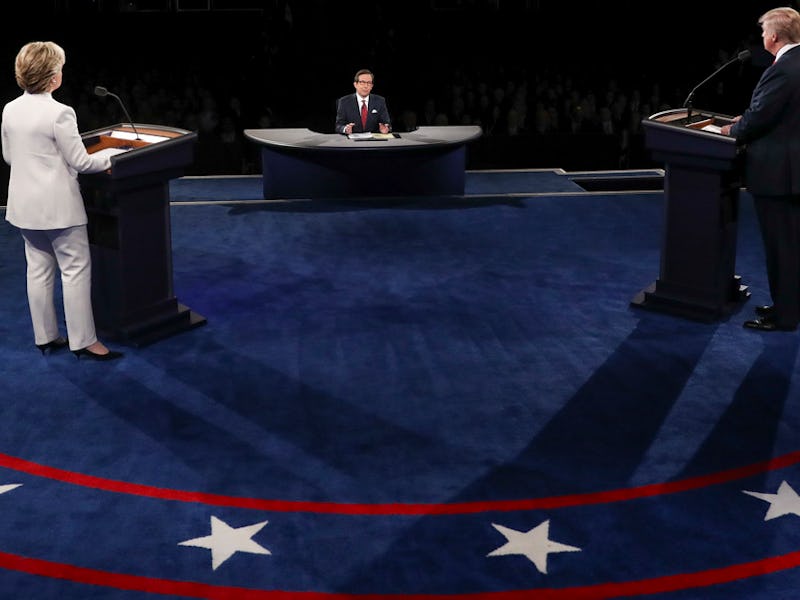This Election Comes Down to Who Has the Better Mindset
Presidential composure is as simple as a state of mind.

“Are you fit to be president?” is one of the most common campaign standbys presidential candidates get asked. This election has proven to be one that considers that question very seriously — from both the candidates’ senior citizen status, to Donald Trump’s bizarre bill of health from his doctor, to accusations of stamina, fitness, and hiding pneumonia from the public for Hillary Clinton, the fitness test for presidency has focused mostly on the health side.
What we should be considering, however, is the psychological aspect. What is the ideal mindset for a person entering the Oval Office for at least four years?
Carol Dweck’s book Mindset has been one of the most influential works about how successful people manage challenges that come their way, since its first publication in 2006. In it, she breaks down the two mindsets that most people fall into - the fixed mindset, and the growth mindset.
A look at the fixed versus growth mindset, as defined by Dweck.
The fixed mindset, as Dweck describes it, is “believing that your qualities are carved in stone,” which creates an urgency to prove yourself over and over.” To the contrary, the growth mindset is “based on the belief that your basic qualities are things you can cultivate through your efforts.” That is, the growth mindset is all about learning — where a person with a fixed mindset would be embarrassed to admit their personal or professional failures, growth-minded individuals view failure as an opportunity to learn. Fixed, Trump; growth, Clinton.
On the surface, this is a critical mindset for an effective president to have, because the presidency comes with no shortage of hard-learned lessons, but the number of successful people who are not hard-wired to think this way is pretty astounding.
That’s not to say either of the candidates are quick to acknowledge their mistakes — going too far in that direction could be political suicide, depending on the admission. Clinton has made her share of mistakes as a politician, but you’re hard-pressed to find a controversy in her career, from Whitewater to the emails, that she did not learn from. Hillary Clinton, with little exception, does not make the same mistake twice, and has routinely made setbacks — from a primary loss, to Monica and Gennifer — as a chance to become stronger. Donald Trump, however, has declared bankruptcy multiple times, has a record of assaulting women multiple times, and has engaged in unsavory business practices (see: Trump University) a number of times. Throughout his life, there are examples of his making the same mistakes, ignoring criticism, being threatened by others, and not accepting the challenge of self-examination.
If that’s not compelling enough evidence of the fixed versus growth mindset, take a look at the candidates’ performance in the debates on Wednesday night. Clinton had years of debate experience to bring to the stage last night, and had made her share of mistakes in the past — in 2008, she was criticized for going too hard on President Barack Obama for his associating with ‘slum lords,’ and the ever-present, slightly sexist likability specter that has been haunting her for the entire election season.
Regardless of whether you agree with her or not, theres a clear growth mindset implied in this performance, an understanding of her opponent, and using her past mistakes to buttress future performance. Clinton’s willingness to serve as President Obama’s Secretary of State after losing to him in the 2008 Democratic primaries, demonstrates this: “Those with the growth mindset find setbacks motivating,” Dweck explains in Mindset. Of the fixed mindset, she says, “setbacks label you.”
Donald Trump’s performance in all three debates demonstrate the hallmarks of the fixed mindset, one that hinges on the idea that one is born with a natural and fixed amount of talent, and that they are entitled to success. It’s no secret that Trump has not handled failure inside of this campaign well, particularly in the debates — his repeated interjections of “wrong,” consistently taking bait Clinton dangled in front of him. This point of view indicates that Trump does not view the potential of failure as an opportunity to grow, but rather something to define oneself by, a robbery of what one believes to be their deserved success. Trump’s inability to accept failure is likely because of the fixed mindset hallmark of viewing a single failure as a devastating blow, providing some context for his repeated assertions that his falling behind in the polls is “rigged.”
Trump and Clinton at last night's debate.
“He never apologized or says sorry for anything,” Clinton said at last night���’s debate. This is another fixed mindset trait — an admission of guilt to a fixed mindset, indicates an irreconcilable failure, rather than an opportunity to do better.
Successful people can be molded in the fixed and growth mindset, but the latter, Dweck asserts, is hinged on the “practice makes perfect” learning model and generally results in a more psychologically healthy person. Fortunately for the rest of us, Dweck assures us that living in a fixed mindset is a changeable state that plagues many a talented person, and it takes a restructuring of thought to make failure not a reason to give up, but a chance to be smarter.